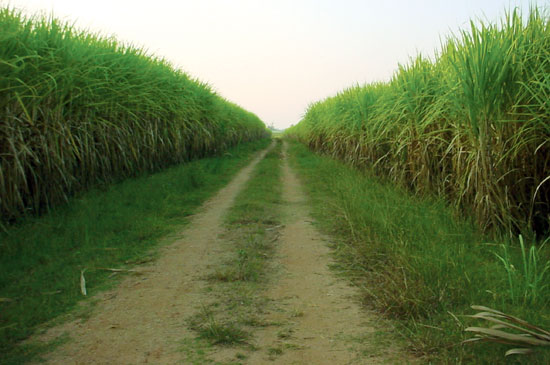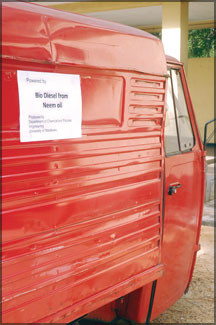Viable solution to energy crisis
Biofuel on top of agenda:
By Sajitha Prematunge
[email protected]
 |
 |
| Dr.
Sanja Gunawardena |
Dr. Marliya
Ismil |
Sixty percent of oil in Sri Lanka is used for the transportation
sector. As the latest Annual Report of Central Bank indicates, the Sri
Lankan Government spent 2,496.8 million US $ on petroleum in 2007, which
is 22.1% of the total composition of imports.
Consequently finding an alternative for fossil fuel has been on the
table for discussion ever since 'Limits to growth' foretold the imminent
depletion of all fossil fuel deposits. One such alternative - the
production of biofuel, for all its debates and controversies, is still
practised in developed countries.
Although the main disagreement concerning the issue is producing
biofuel using edibles, scientists the world over, are now focusing on
exploiting non edibles.
Producing bio-diesel using oil bearing crops such as coconut, palm
and jatropha is not unheard of in Sri Lanka, but large scale experiments
have not been conducted yet. The Brazilian transportation service
depends 100% on ethanol and USA 20%.
Unfortunately Sri Lanka is lagging behind. Although jatropha is a
potential good candidate for bio-fuel production there isn’t a good
acreage of flowering seeds. However there is still much hope for Sri
Lanka’s transport service.
The University of Moratuwa has tested methane, acquired from bio-gas
and landfills, as fuel for three wheelers and is now focusing on
bio-diesel and ethanol.
 “As Sri Lankans, time has come for us to think of alternatives. The
technology already exists. We just have to be more organized in terms of
determining feedstock.” say Dr. Marliya Ismil and Dr. Sanja Gunawardena
of the Department of Chemical and Process Engineering, University of
Moratuwa. “As Sri Lankans, time has come for us to think of alternatives. The
technology already exists. We just have to be more organized in terms of
determining feedstock.” say Dr. Marliya Ismil and Dr. Sanja Gunawardena
of the Department of Chemical and Process Engineering, University of
Moratuwa.
Their research which initially started as a student project using
coconut oil to produce bio-diesel has now moved on to vegetable oil as
well as non edible oils such as neem, jatropha and rubber seed.
“At first we used waste vegetable oil from KFC and subjected them to
a chemical conversion.” Dr. Sanja explained. What is called a
transesterification process involves mixing the oil with alcohol. This
breaks the mixture into two compounds - Eater and glycerol. While Ester
is used as bio-diesel, glycerol need not be wasted, since it can be used
in pharmaceutical products.
But producing bio-diesel from waste oil, entails a host of other
problems. All oils are triglycerides and have a high concentration of
Free Fatty Acids (FFA), specially non refined oils from plant extracts.
An excess of FFA requires a pretreatment esterification process,
specially in the case of non edibles.
“If not, we end up with soap.” Dr. Sanja explained that soap is
produced using the same esterification process. Soap reduces the
efficiency of the bio-diesel. Dr. Marliya said “We have tried many oils
and have done lab scales for all. We can optimize the process.”
“Cultivating jatropha on either sides of railway tracks as proposed
and yielding its harvest seems far fetched when considering the fact
that there is an alternative already available in abundance and ready to
be harvested.” says Dr. Sanja. However considering feedstock, the most
viable alternative - according to Dr. Sanja and Dr. Marliya - is rubber
seed oil produced diesel.
A fraction of the total potential of rubber seed oil is currently
being used in paint and soap industries. “But the rest gets dried up
unused.” There are 180,000 ha of rubber cultivation in Sri Lanka.
Hypothetically speaking, she explains that if 75% of the seeds from
these trees are collected and the extracted fuel has an efficiency of
65%, it can account for 14% of the diesel consumption of the railway
sector, the total Sri Lankan rubber seed oil potential - 5000 tons.
Dr. Sanja explained that, although the calorific value of bio-diesel
is less than petroleum diesel and as a consequence less milage can be
derived, it has added advantages. Dr. Marliya explained that the
bio-diesel extracted from rubber seed oil emits no harmful fumes and is
eco friendly. Plus no alterations in the mechanics of engines is needed
for the adaptation.
She further explained that the rubber seed oil for their research
were obtained from a local mill and the chemicals from Pettah. “The
chemicals we use in the process of esterification is very expensive, and
we buy them in retail. The wholesale prices may be much less.”
Consequently the research expense was considerably high, although mass
production of bio-diesel using rubber seed oil - according to them -
will be more economically viable than diesel in the long run.
Although Sri Lanka is not self sufficient in sugar and sugar cane has
to be cultivated in excess to supply the required amount of ethyl
alcohol, ethanol still seems to be another very promising potential
alternative considering the fact that only 18,000 ha are used out of
nearly 70,000 ha that have been recommended for sugar cane cultivation,
by the Mahaweli Project.
As explained by Himantha Cooray, a temporary lecturer of the
Department of Chemical and Process Engineering, University of Moratuwa,
alcohol derived by sugar cane needs to be purified or concentrated by
dehydration in order to be mixed with petrol to make Alcatrol.
“If the alcohol contains water, it does not mix with petrol. The
extraction has to be 99% alcohol to be mixable.”
He explained that the Pelwatta Sugar Corporation currently produces
95% alcohol for potable purposes. “But getting from 95% to 99% is what’s
difficult.” Himantha explained that the current method available for
this purification process - adsorption - is highly expensive, due to
high energy consumption and consequently not cost effective.
It involves running the alcohol through a column that contains a
medium which extracts the water content in the alcohol.
Although Himantha said that he cannot reveal the mechanisms of it,
because he is in the process of obtaining a patent, the ingenious new
method that he has developed can produce 99% concentrated alcohol with
just 15% energy consumption from that of other methods currently
available.
But no alternative is of use if it further adds to environmental
degradation. Vouching for Alcatrol’s eco friendliness, Himantha said
“engines require oxygen to operate and since Alcatrol consists oxygen, a
natural oxygenation process takes place inside the engine.”
|

Threewheeler donated by Cargills for the research |
Just as in the case of bio-diesel, no modification of the engine is
required for the purpose. Most importantly he pointed out that ethanol
acts as an octane number enhancer. Therefore the octane of Alcatrol is
more impressive than that of petrol, with an octane number of 95.
Therefore the milage that can be obtained is higher.
As combustion efficiency is increased and fuel residue reduced, the
emission of toxic gases, is also cut down. Moreover the quota of CO2
emission is a major criterion in determining alternatives, considering
the pivotal role it plays in global warming. Himantha explained that
Unlike fossil fuel, the net CO2 emission of bio-based fuel can be
considered as ‘0’.
“Ethanol burns CO2 trapped in sugar cane, which the sugar cane
extracted from the atmosphere. So technically we are burning, back into
the atmosphere, CO2 originally extracted from the atmosphere.”
As he explains it’s a cyclic phenomenon where ‘0’ net emission can be
achieved, consequently posing little or no environmental damage.
Himantha finally pointed out that whatever fossil fuel required, we have
to obtain by importing. “Alcatrol is produced in Sri Lanka. By using
Alcatrol we can finally be ‘energy secure’.”
Professor Ajith de Alwis, Head of the Department, Chemical and
Process Engineering, University of Moratuwa, explained that the fuel
bill of Sri Lanka has now exceeded the revenue from export crops like
tea, coconut and rubber. Other Asian countries have high hopes for
bio-fuel.
“But Sri Lanka is sadly lagging behind.” Moreover he pointed out that
the production of bio-fuel is the best and most effective method to pump
money to those under developed marginal land like Monaragala as
potential areas of diesel yielding crop cultivation and in the form of
all other benefits such as job opportunities that the industry would
entail.
“We have bio-diesel, ethanol and bio-gas all three types of bio-fuel.
If we just used the alcohol not to drink but to ‘blend’, it would also
fit well with Mathata thitha.”
Pix by Iresha Waduge |
